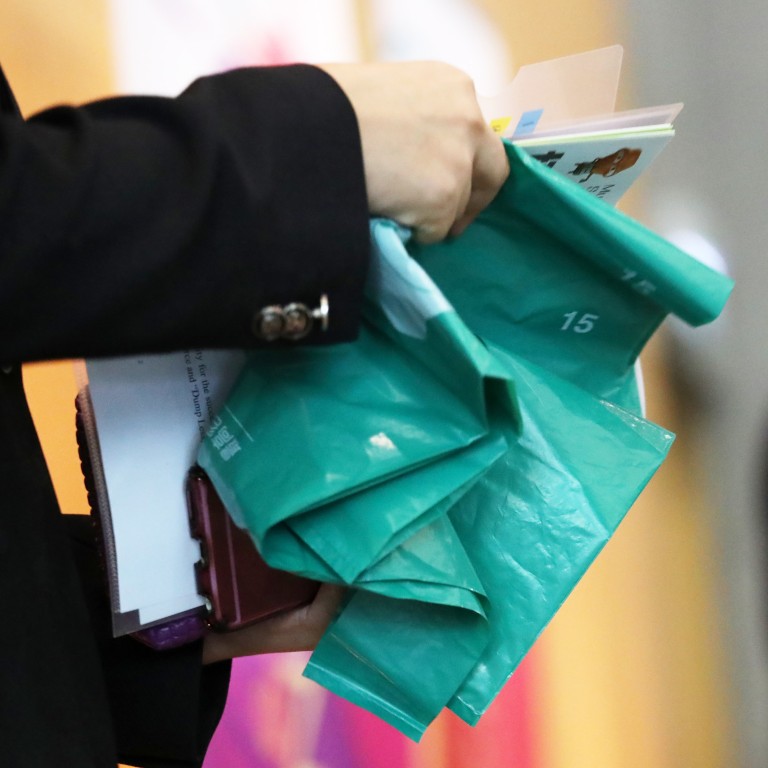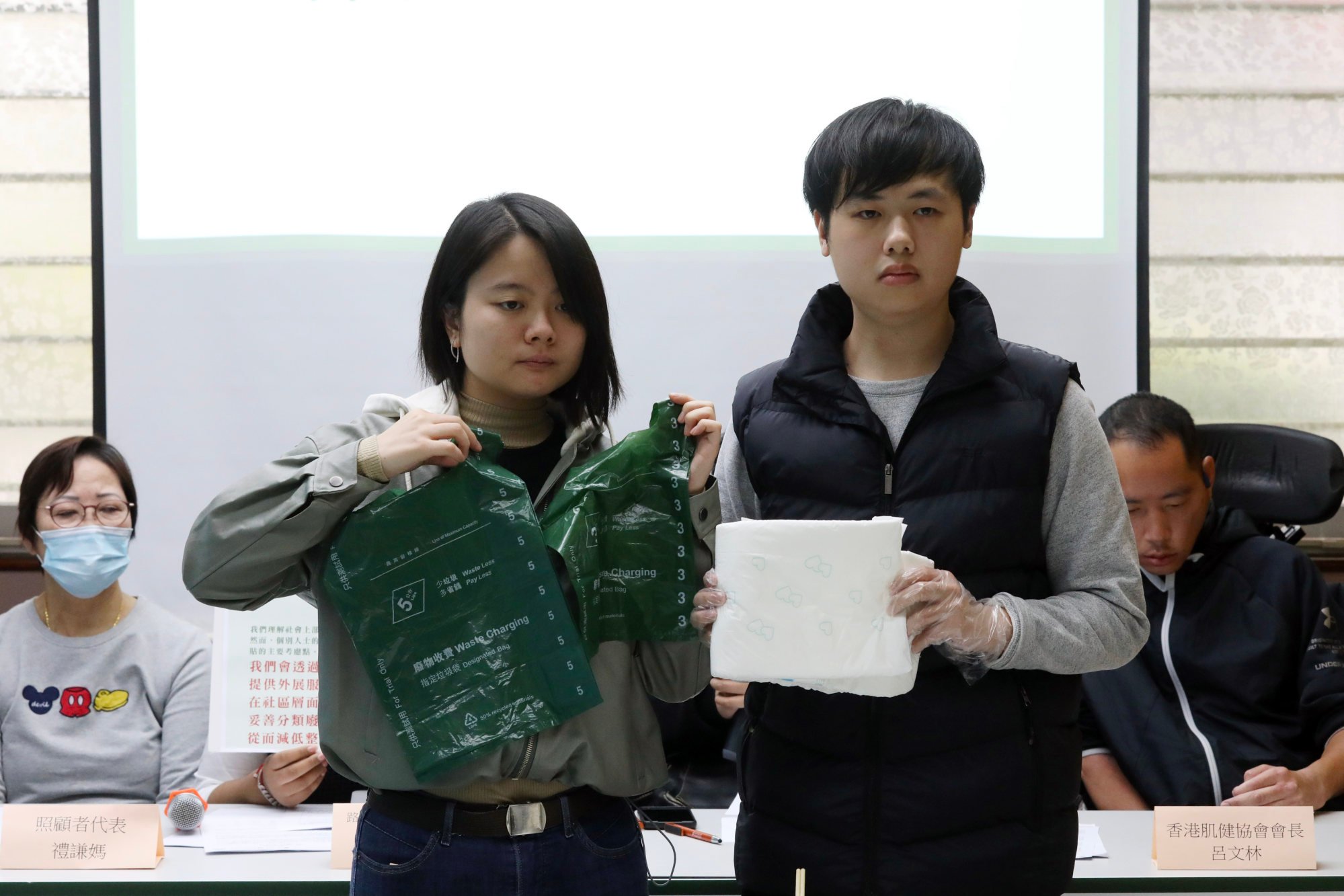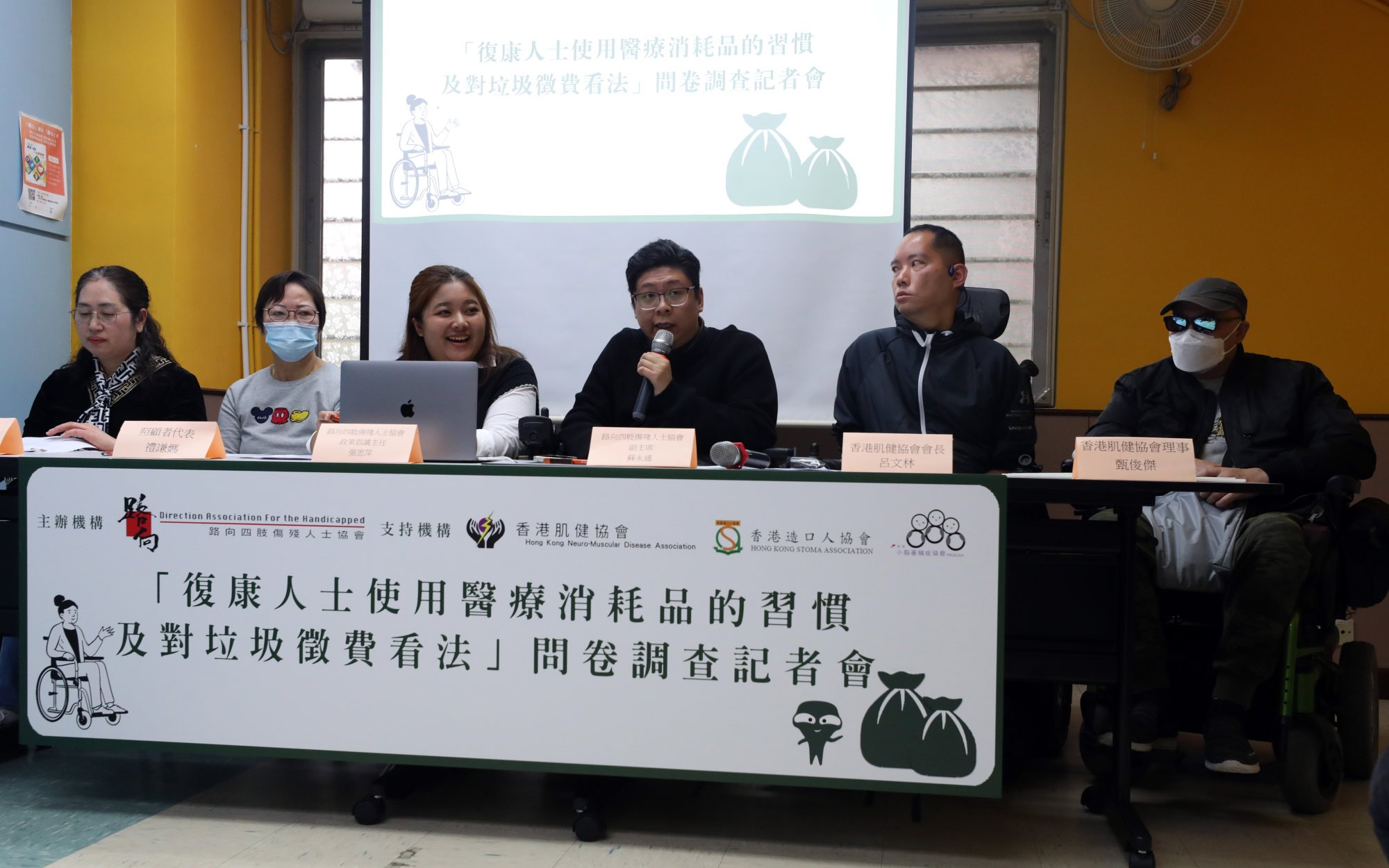
Hong Kong campaign groups appeal for disabled and chronically ill to be given free rubbish bags after waste charging scheme starts
- Appeal comes after survey shows some vulnerable groups will pay much more than the average because of high use of disposable medical supplies
- One association for disabled says it is ‘unfair’ that the disabled and sick may have to pay up to four times more for bags than a regular household of four people
Disabled people and those with chronic conditions should get free rubbish bags after a Hong Kong waste charging scheme comes into force next year, campaign groups have said.
The appeal came after a survey released on Wednesday showed that some disabled people would have to pay four times more than a regular household for government-designated plastic bags because of their heavy use of disposable medical supplies.
“The waste charging scheme is unfair to people with severe physical disabilities or chronic illnesses,” Steve So Wing-tung, the vice-chairman of the Direction Association for the Handicapped, said.
“We understand the importance of the policy, but if our needs are not taken into consideration, we would only fall victim to it.”

But the Environmental Protection Department late on Wednesday appeared to pour cold water on the proposal.
The municipal solid waste charging scheme, designed to cut waste, will take effect on April 1 next year.
The policy will mean people will have to buy government-approved plastic bags, which will be available in nine sizes, at a cost of 11 HK cents (1.4 US cents) a litre.
The association in early December surveyed 100 people with severe physical disabilities, 49 patients with chronic conditions and 31 carers, and found more than 90 per cent of them used disposable medical supplies.
The most common items were disposable gloves, diapers and incontinence insert pads, because more than 40 per cent of the respondents said they needed to be changed at least three times a day.
The next most common throwaway items were wound dressings, cotton balls and disposable bedsheets.
Almost 30 per cent of those surveyed said they needed to use more than five five-litre plastic bags, at 60 HK cents each, each day.
That added up to more than 150 plastic bags a month at a cost of at least HK$90.
Hong Kong’s waste charging scheme has loopholes, cleaning industry warns
So, who is disabled, added that some people would need to fork out more than HK$140 if they used up to eight bags every day.
That would be four times the cost that a household of three to four people would pay using predictions made by the government’s Environmental Protection Department.
“We have to use multiple small bags to handle the trash due to hygiene reasons,” So explained.
“It is impossible for us to store the garbage [in a huge bag] and dispose of it all at once … and those products are not recyclable or reusable at all.”

So said the association had approached the Environmental Protection Department, the Equal Opportunities Commission, the Social Welfare Department and the Office of the Ombudsman, but were only advised to “squeeze the trash bag” to free more space.
Annie Cheung, 70, the carer for 46-year-old son, identified only as Lai-him, who was left quadriplegic more than two decades ago after a car crash, predicted the extra expense for rubbish bags would only add to her heavy financial burden.
“I need to change his diaper every four hours – that means at least six times a day, and each time I need one five-litre bag to hold the diaper, insert pad, bedsheet and disposable gloves … and we still have other domestic waste,” she said.
Cheung added that the family lived off pension payments, but spent more than HK$7,000 a month on medical supplies and a domestic helper to help look after her son.
Hong Kong’s long-awaited plan to charge residents for waste delayed to next year
“I would have to tighten my belt further when the new policy comes,” she predicted.
He You Ping, the vice-chairman of the Hong Kong Stoma Association, said the scheme would be a “punishment” for stoma users because their living expenses were already high.
“Each stoma bag already costs us around HK$30 to $90 … just imagine you need to pay HK$10 whenever you go to the toilet, but you have no or little income in the first place,” she said.
“For those with little experience, their stoma bag may burst sometimes and they would need a lot of supplies, especially plastic bags, to clean up.”
Lui Man-lam, the president of the Hong Kong Neuro-Muscular Disease Association, highlighted that the government had not included disabled people in a scheme that will give those on comprehensive social security allowance and old age living allowance HK$10 a month to help with the cost of approved bags.
He said he was also worried that hospitals and care homes might charge patients and residents more after the new waste scheme started.
The groups appealed to the government to hand out the government-approved rubbish bags free of charge to those in need and let their doctors decide how many they needed.
They added district councillors and members of community care teams should be deployed to publicise any free rubbish bag allowance to people who may not be reached by other methods.
The Environmental Protection Department said it understood that some may need to dispose of more waste for a variety of reasons, but exemptions for particular groups would undermine the “polluter pays” principle of the policy.
The department said there was no provision in the legislation that would allow the government to provide free rubbish bags specifically for disposable medical items.
Officials added that exemptions of that kind would also create administrative and enforcement problems, because it would be difficult to verify the identity of individuals.

